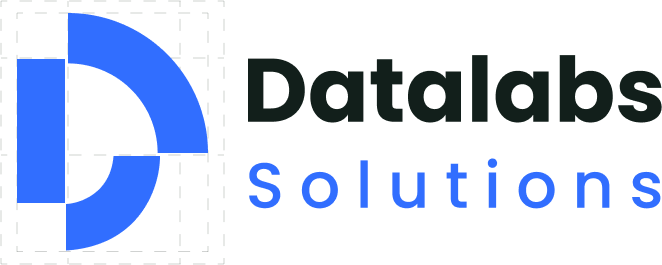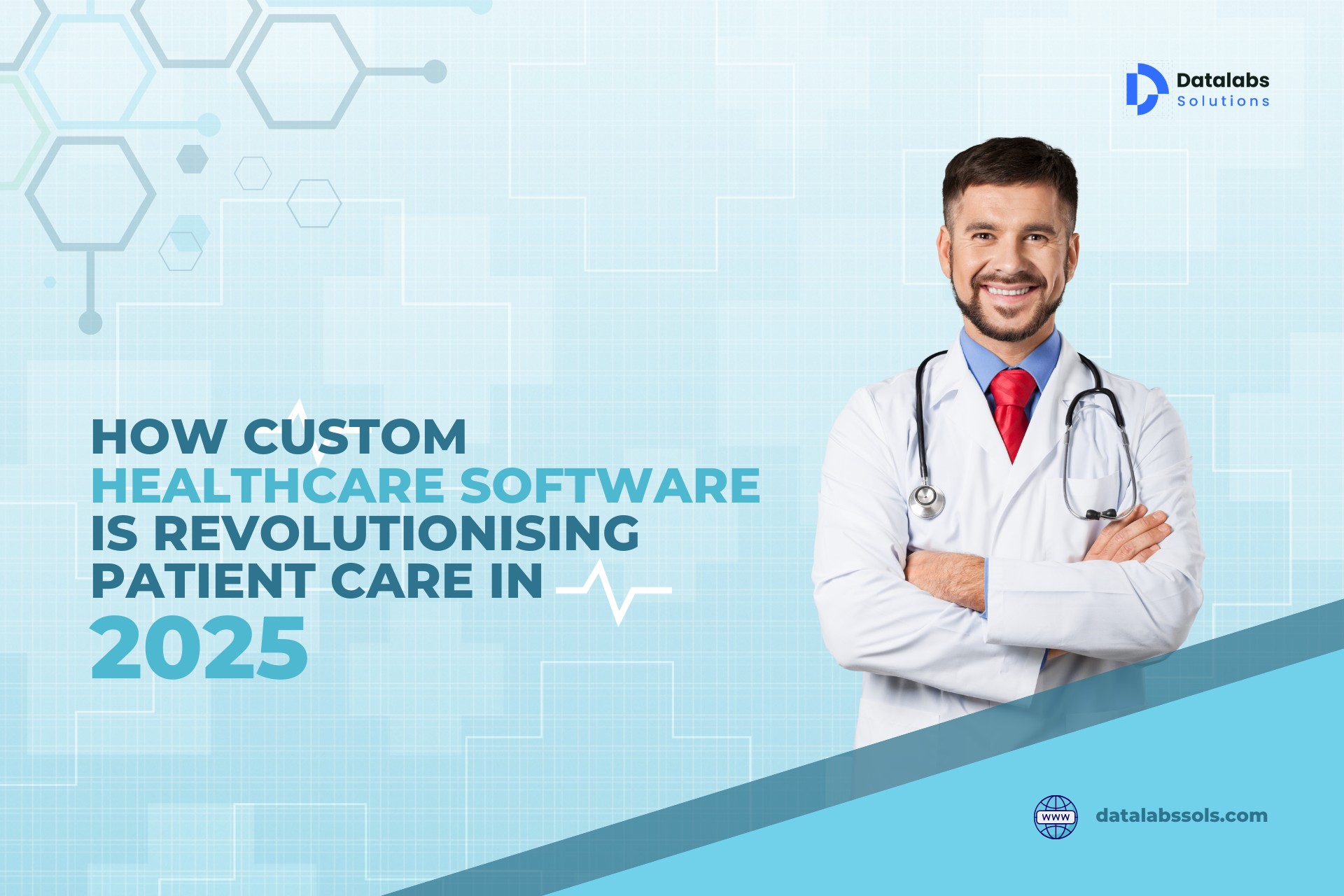In 2025, the healthcare sector stands at a transformative crossroads. With an increasing demand for personalised, efficient, and technology-driven care, traditional systems are giving way to intelligent, patient-centric platforms. At the heart of this shift is custom healthcare software—a solution tailored to meet the unique needs of healthcare providers, patients, and regulators alike.
At Datalabs Solutions, we’ve seen first-hand how bespoke digital systems are elevating patient outcomes, streamlining hospital operations, and ensuring compliance in an ever-evolving regulatory landscape. In this article, we’ll explore how custom healthcare software is reshaping the future of patient care in 2025.
The Digital Health Boom: A 2025 Snapshot
The global healthcare software market is projected to reach USD 104.1 billion by 2030, growing at a CAGR of 10.7% from 2023, according to Grand View Research. This surge is fuelled by several critical factors:

- The long-term impact of the COVID-19 pandemic, which accelerated digital adoption
- Increased use of Remote Patient Monitoring (RPM) and telemedicine
- The growing importance of data security and compliance
- A push for interoperability through standards like FHIR (Fast Healthcare Interoperability Resources)
Patients now expect mobile-first access to care, real-time updates, and seamless digital experiences—a reality only achievable with software built specifically for their care journeys.
Why “Custom” Over “Off-the-Shelf” Matters
Off-the-shelf healthcare solutions often fall short in meeting the complex, nuanced needs of healthcare providers. They may lack flexibility, fail to integrate with legacy systems, or be overburdened with irrelevant features.
In contrast, custom healthcare software offers:
- Tailored functionality for different specialties (oncology, paediatrics, mental health, etc.)
- Scalable architectures that evolve with organisational needs
- Integration with existing hospital ecosystems (EHRs, labs, pharmacies, billing)
- Enhanced data privacy through role-based access and encryption
- Compliance alignment with HIPAA, GDPR, and NHS security frameworks
Read how we address healthcare-specific needs at Datalabs.
Key Areas of Transformation Through Custom Software
1. Remote Patient Monitoring (RPM) & Telehealth
Custom RPM systems now allow providers to remotely track patient vitals using IoT-enabled devices like glucose monitors, blood pressure cuffs, and wearables. These systems are integrated with alert thresholds and AI to detect anomalies, sending immediate notifications to caregivers.
Example: A tailored RPM platform for diabetic patients can trigger alerts for critical glucose readings and auto-schedule follow-ups with endocrinologists.
According to NIH research, RPM has been linked to lower hospital readmission rates and improved chronic disease management.
2. Electronic Health Records (EHR) & Interoperability
Generic EHR systems often hinder workflow due to rigid interfaces and poor customisation. Custom-built EHRs allow:
- Specialty-specific data fields
- Built-in analytics dashboards
- Seamless API integration with pharmacies, labs, and imaging centres
FHIR-enabled custom EHRs ensure interoperability, reducing data silos and improving real-time clinical decision-making.
3. AI-Powered Diagnostics and Clinical Decision Support
In 2025, AI integration is no longer a futuristic concept—it’s a standard for leading institutions.
Custom diagnostic platforms:
- Use machine learning models to flag anomalies in radiology and pathology scans
- Analyse historical patient data to recommend treatment plans
- Apply Natural Language Processing (NLP) to summarise patient notes
A Lancet Digital Health study found AI diagnostic tools matched or outperformed radiologists in detecting certain cancers when used alongside custom interfaces tailored to hospital environments.
4. Mobile Health Apps and Patient Engagement
Patient engagement apps developed with specific user personas in mind can drastically improve adherence and satisfaction. Features include:
- Appointment scheduling and reminders
- Medication tracking and alerts
- Chatbots for 24/7 Q&A
- Integration with Apple Health, Fitbit, and other wearables
Custom UX/UI enhances accessibility for the elderly and those with disabilities—an area where generic apps often fall short.
5. Workflow Automation & Hospital Operations
From billing to bed management, custom platforms streamline internal processes.
Examples:
- AI-based staff scheduling that adjusts in real-time based on patient load
- Auto-verification of insurance claims before discharge
- Smart inventory management integrated with supplier APIs
The result? Reduced operational costs, increased productivity, and improved staff morale.

Ensuring Compliance & Data Security by Design
Security is not an afterthought in custom systems—it’s embedded from the ground up.
Custom healthcare software ensures:
- End-to-end encryption for sensitive data
- Audit trails for accountability
- Role-based access control
- Compliance with:
- HIPAA (USA)
- GDPR (Europe)
- NHS Data Security and Protection Toolkit (UK)
At Datalabs, we develop platforms that are ISO 27001-ready and regularly penetration-tested.
Emerging Technologies Shaping Custom Healthcare in 2025
Custom software isn’t just responsive—it’s proactive. It integrates:
- AI & ML for clinical insights
- IoMT (Internet of Medical Things) for real-time patient monitoring
- Blockchain for tamper-proof medical records
- AR/VR for surgical training and patient education
These technologies, when embedded in bespoke platforms, offer unparalleled agility and precision in care delivery.
Challenges in Building Custom Software (and How to Overcome Them)
Despite its benefits, custom development has challenges:
- Higher initial investment compared to SaaS tools
- Longer development timelines
- Need for ongoing updates
However, the ROI is substantial. With proper planning, agile development cycles, and a strong technical partner like Datalabs Solutions, these challenges become strategic investments in future-readiness.
How Datalabs Solutions Is Revolutionising Patient-Centric Tech
At Datalabs, we don’t just build software—we co-create care ecosystems.
We work closely with:
- Clinicians to understand care workflows
- Hospital administrators to align business goals
- Legal advisors to ensure end-to-end compliance
Our healthcare software projects range from AI-driven diagnostic tools to fully integrated RPM systems.
Explore our Healthcare Projects Portfolio to see how we’re helping providers deliver smarter, safer, and more personalised care.
Conclusion: The Future of Healthcare Is Tailored
In 2025 and beyond, one-size-fits-all healthcare platforms are no longer fit for purpose. Custom software provides the precision, agility, and patient focus required for modern care delivery.
Whether you’re a hospital administrator, private clinic, or digital health startup, investing in custom healthcare software is no longer a luxury—it’s a strategic necessity.
📞 Ready to build a custom healthcare platform?
Contact Datalabs Solutions today to start your digital transformation journey.

